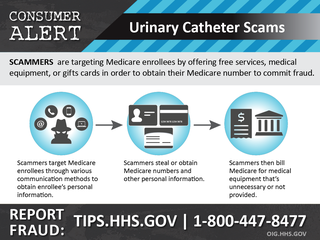Consumer Alert: Urinary Catheter Scams
The U.S. Department of Health and Human Services Office of Inspector General (HHS-OIG) is alerting the public about a fraud scheme involving Durable Medical Equipment (DME), specifically urinary catheters.
Scammers are targeting Medicare enrollees through phone calls, internet ads, and text messages with offers of free services, medical equipment, or gift cards upon confirming their personal information and eligibility for specific Medicare services. Often, the enticement for the individual is that they are “qualified” for items “at no cost” or “free.” Once the scammers obtain the enrollee’s personal information, monthly billing to Medicare will begin for medically unnecessary urinary catheters that may or may not actually be sent to the enrollee.
Typically, the scheme begins with a contact from an unscrupulous DME company claiming they work for Medicare or are calling on behalf of Medicare. Their goal is to obtain the enrollee’s Medicare number.
Usually, the DME company will obtain its own authorizing provider, who does not know or have a relationship with the enrollee, to sign an authorization for DME. Occasionally, the DME company may get the enrollee’s provider to sign an authorization for the DME.
HHS-OIG is asking the public to stay alert and report any potentially fraudulent activity along these lines to the HHS-OIG Hotline (1-800-HHS-TIPS). Through tips and complaints, HHS-OIG can document instances of fraud and take the necessary steps to protect enrollees and Federal health care programs like Medicare.
Protect Yourself
- If you receive a call from someone offering you free urinary catheters or other Durable Medical Equipment and services that will be billed to Medicare, hang up immediately.
- Be suspicious of anyone who offers you free medical equipment and then requests your Medicare number. If your personal information is compromised, it may be used in other fraud schemes.
- If medical equipment is delivered to you, don't accept it unless it was ordered by your physician. Refuse the delivery or return it to the sender. Keep a record of the sender's name and the date you returned the items.
- Review any Explanation of Benefits documents you receive. Scan for any supplies you did not order.
- Medicare enrollees should be cautious of unsolicited requests for Medicare numbers. No one other than your provider’s office should ever request your Medicare information. There is no other circumstance when it is appropriate or safe to provide it.
- Prevent and detect health care fraud by staying aware of urinary catheter and other scams. Your local Senior Medicare Patrol (SMP) program can help. Visit www.smpresource.org or call 877-808-2468 for more information.
- If you suspect Medicare fraud, report it immediately online or call the HHS-OIG Hotline at 1-800-HHS-TIPS (1-800-447-8477).
Last updated April 30, 2024

